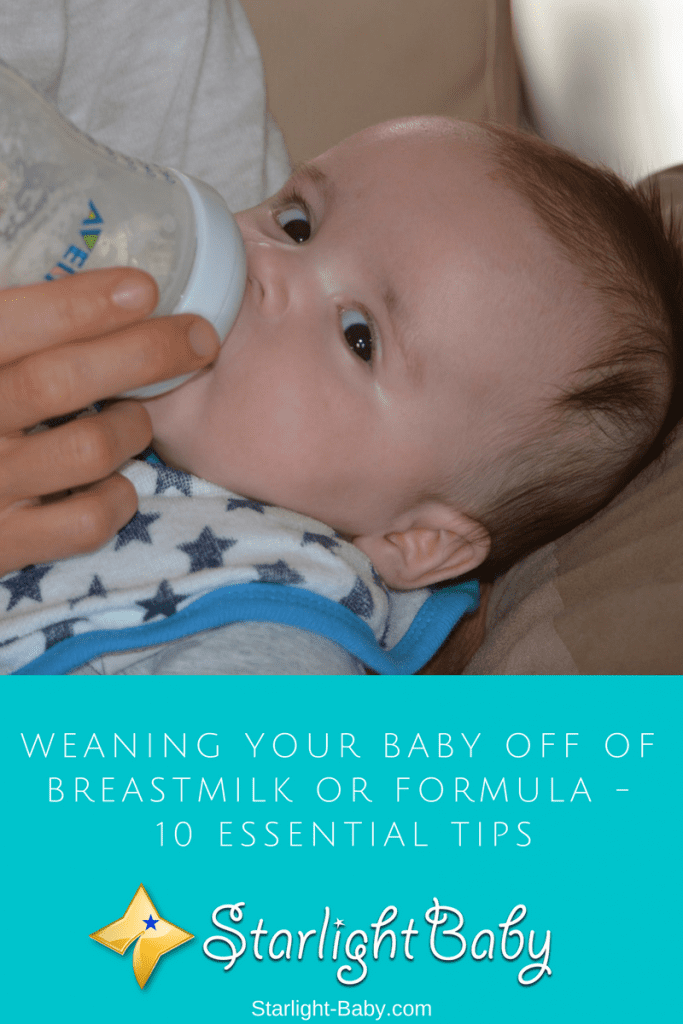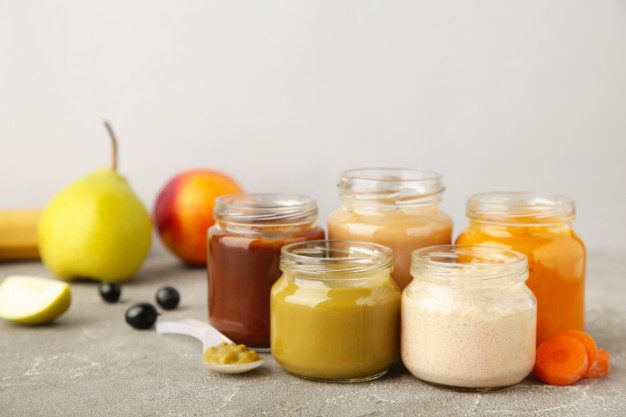
Transitioning from breastfeeding or bottle feeding your baby to introducing solids, can be really daunting. When exactly should you start introducing solids and what’s the best way to do it?
Unsurprisingly parents have a lot of questions about weaning their baby. You’ve only just got to grips with milk feeds, so the thought of starting yet another routine can be soul-draining. If you’re nervous or unsure about weaning your little one, here we’ll reveal 10 great tips to help make the transition smoother and easier.
Table of Contents
1. Getting The Timing Just Right
 The most common questions parents have is when should the weaning process begin? Official guidelines suggest starting at around six months old. However, as you’ll likely already have discovered, babies don’t always develop at the same rate as the guidelines!
The most common questions parents have is when should the weaning process begin? Official guidelines suggest starting at around six months old. However, as you’ll likely already have discovered, babies don’t always develop at the same rate as the guidelines!
While waiting a minimum of six months is a good idea because it gives the digestive system a chance to develop fully, don’t be afraid to wait longer if you feel it’s necessary. Instead, look for signs that your little one is ready to start eating solids. Make sure they have good hand control so they’ll be able to easily grab the food and put it in the mouth.
If you’re still unsure as to whether now is the right time to start, don’t be afraid to seek advice from your pediatrician.
2. Introduce Solids Gradually
 Once you’ve established it’s the right time, it’s important not to rush into giving your little one solids. Start to introduce them gradually and build-up as baby gets used to eating them. So, for example, start out feeding them just one solid food each day.
Once you’ve established it’s the right time, it’s important not to rush into giving your little one solids. Start to introduce them gradually and build-up as baby gets used to eating them. So, for example, start out feeding them just one solid food each day.
It also helps to start when baby is feeling relaxed. Remember, routine is important for babies, so try to introduce solid food at a time you’ll want to stick to. As baby gets used to eating one portion of solids a day, you can slowly start to work your way to two solid meals.
3. Don’t Stress Over How Much They Eat
 To start with, you’ll typically find very little solid food goes into baby’s mouth. This is because although they may be old enough and ready to start on solids, it can take a while for their hand to mouth coordination to develop. The result, is more food will end up around your little one’s mouth, face and on the floor, than it will in their mouth.
To start with, you’ll typically find very little solid food goes into baby’s mouth. This is because although they may be old enough and ready to start on solids, it can take a while for their hand to mouth coordination to develop. The result, is more food will end up around your little one’s mouth, face and on the floor, than it will in their mouth.
Similarly, eating solid food is an adjustment compared to milk. So, your baby isn’t going to be able to eat a lot in one go. They need time to adjust to the different tastes and textures so don’t be surprised if they aren’t overly keen on eating what you’re offering.
4. Make It Fun
 The key to easing baby into anything new is to make sure they have a fun, relaxed experience. While it may seem counter-productive, encourage your little one to have fun with their food. Let them feel it, squish it and enjoy the different textures, sights and smells of the food.
The key to easing baby into anything new is to make sure they have a fun, relaxed experience. While it may seem counter-productive, encourage your little one to have fun with their food. Let them feel it, squish it and enjoy the different textures, sights and smells of the food.
The more fun they have, the more enthusiastic they will be about trying it. You could also pop some of the food in your own mouth, before offering some to baby. If they see you eating it, they’ll want to try some too.
5. Don’t Be Alarmed If They Cough
 Your baby’s gag reflex is pretty good, so when food goes towards the back of the throat, they’re going to cough, potentially a lot! This isn’t usually anything to be concerned about.
Your baby’s gag reflex is pretty good, so when food goes towards the back of the throat, they’re going to cough, potentially a lot! This isn’t usually anything to be concerned about.
When they’re first starting out on solid food, they obviously won’t know exactly how to eat and chew the food. So, it’s common for large pieces to end up touching the back of the throat. Obviously, it’s important to ensure you’re giving very tiny amounts of food so it doesn’t pose an actual choking risk. To be safe, it’s a good idea to chat to your pediatrician before starting weaning your little one onto solids, as they’ll be able to tell you more about portion sizes and tips on avoiding potential choking hazards.
6. Try And Eat Together
 A simple yet very effective weaning tip, is to include baby in family mealtimes. They love being included and it’s no fun eating alone. So, you’ll have much more success if they see you and the rest of the family eating this strange new food.
A simple yet very effective weaning tip, is to include baby in family mealtimes. They love being included and it’s no fun eating alone. So, you’ll have much more success if they see you and the rest of the family eating this strange new food.
This is also a great learning opportunity for baby. They learn from what you do, so as they watch you eat, they’ll see how it’s supposed to be done. This can speed up their ability to feed themselves.
7. Consider Switching Routines
 This may sound daunting, but many parents have found it really helpful to switch up their little one’s routine.
This may sound daunting, but many parents have found it really helpful to switch up their little one’s routine.
If your baby is used to nursing right before bed for example, it can be difficult sticking to this routine when you’re trying to introduce solids. Obviously, you don’t want them eating solid food right before bed. So, instead offer a bottle or small cup of milk, then distract them with a bedtime story. It sounds easy, but if you’ve ever tried to change your baby’s routine, you’ll know just how difficult and frustrating it can be. Persevere and the crying and tantrums will soon be over!
8. Ensure Baby Isn’t Too Hungry
 Logically, it seems best to offer baby their first solid food when they’re really hungry. However, this is actually a bad idea. If they’re over hungry, they’ll want food quickly and that means the food they’re used to eating. Try to give them something new and they’ll more than likely have a meltdown.
Logically, it seems best to offer baby their first solid food when they’re really hungry. However, this is actually a bad idea. If they’re over hungry, they’ll want food quickly and that means the food they’re used to eating. Try to give them something new and they’ll more than likely have a meltdown.
So, a good option would be to give them a little milk first, then offer solid food. If you are planning on trying this method, try to give the milk around half an hour before you plan to give them solid food.
9. Consider Blending The Food
 Switching from liquid to solid food can be a big shock for baby. Therefore, it helps to start out with slightly runny foods. This is where a blender comes in really useful. You can blend up practically any food and offer it to baby.
Switching from liquid to solid food can be a big shock for baby. Therefore, it helps to start out with slightly runny foods. This is where a blender comes in really useful. You can blend up practically any food and offer it to baby.
This is also great for trying to get them to eat something they’ve previously refused. You can blend a food that they weren’t overly keen on, with another different food, to combine the flavors.
10. Use Soothing Classical Music
 When baby is trying new foods, it can be a daunting experience. They could be nervous, which would make them less likely to try and enjoy the different foods on offer. One way to calm those nerves and make their new solid mealtimes a success, is to enlist the help of classical music.
When baby is trying new foods, it can be a daunting experience. They could be nervous, which would make them less likely to try and enjoy the different foods on offer. One way to calm those nerves and make their new solid mealtimes a success, is to enlist the help of classical music.
You’ll be surprised just how much this tends to work. It can even provide enough distraction for you to sneak food into baby’s mouth. By the time it’s in there, they’ll have no choice but to chew it and experience the unique flavors and textures.
Conclusion
Overall, weaning your baby isn’t always easy, but as with anything new, perseverance is the key to success. Don’t feel like you need to rush into the weaning process. Do it as slowly as you want. There is no right or wrong age to start. Simply follow babies lead and do it at a pace that you feel comfortable with too.
Have you got any great weaning tips that worked wonders for you and your baby? Share them below…

Yes, I completely agree about when you should stop breastfeeding. I think the most important is to do it when both, you and your baby, are ready to stop. You don’t have to stop at exactly when it’s six months old.
I stopped breastfeeding my boy when he was seven months old. Of course, this isn’t just done instantly – one day you breastfeed them then you just stop altogether. It’s a process and like you’ve described above you should use these little tricks and tips to help him get used to not getting feed this way anymore. It might be very difficult at first because they feel very attached to breastfeeding, plus you also feel very close to the child while doing it but you have to do it at some point – don’t forget that.
The most useful tip I can give to moms that will still have to go through the process of weaning is to take it SLOW. You don’t have to rush it. You have time so don’t feel under pressure. You can very, very slowly get baby to start realizing that breastfeeding is coming to an end.
Wonderful indeed is the write-ups. I will however stress the ease of weaning a baby totally after two years. Partial weaning should also be on request due to variatoon ib the way children grow, develop and react to different stimuli. Good luck to all mothers.
My baby is four months old and in few months we must get ready to introduce solid food. We had to feed formula milk during the first week because my wife was not lactating enough. Later her breasts went full and there was enough breast milk for the baby. Many experienced parents have told me, you should begin with cereals like rice, wheat, corn, and soy and always add butter and sugar.
Thanks for sharing these tips. These ideas will surely help a new parent like me.
Weaning off babies off breast milk is a process parents needs to take gradually, there is no need to rush the baby off breast milk because it may have a lasting effects on the baby’s eating habits.
I find all these tips very useful, especially on introducing solid little by little and watch the baby’s reaction to such new trend away from breast milk. Some babies tend to take to solids with ease while others take time to adjust to the new food. What a parent needs is to remain patient with the baby because with time, the baby is definitely bound to adjust to the new food.
When my mom was nursing my kid sister, then, she had such issue of changing from breastfeeding to normal solid meals for her. There was this stomach upset that my kid sister started having them and that’s what made my mom to wait a little longer for her to reach 8 months before she could feed normal. So, I agree with you on the fact that it is all about getting the timing right.
In my opinion on when to start considering weaning off a baby from breastfeeding to solids, the child should have at least breastfeed for close to one year and six months. By then, his or her digestive system would be in a great shape to take on solid food.
This process should never be rushed, it must be taken gradually and keep a very close eye on the reaction and body changes of the baby with the new food introduction. This would help such parent to know at what pace to keep up with the new food introduction.
We introduced solid foods to our baby when he was 6 months. However he began eating solid food regularly only when he was 7 months old. The baby is one year old. He eats solid food three times a day and mother’s milk several times in a day. We have decided to continue feeding him with mother’s milk until he is two years old.